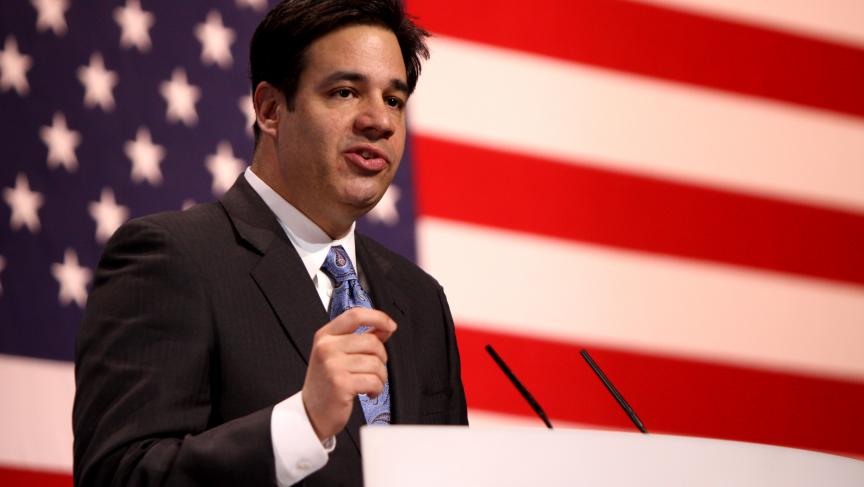House and Senate leaders and the president apparently reached a two-year budget agreement this week that increases federal spending by $320 billion, and conveniently for everyone running for re-election next year extends the debt limit until after the 2020 election. The deal also does away with budget caps placed in law in 2010, but regularly ignored since.
The sound you hear is the nation’s fiscal can tumbling down the road, while in the background you can detect the not-so-faint odor of political hypocrisy. A review of the numbers provides some stunning figures that our grandkids are going to hate us for.

Discretionary federal spending is growing at a substantially faster rate than it did under Barack Obama and by the Trump Administration’s own estimates the deficit for the current year will top $1 trillion. It was $799 billion last year and $587 billion in Obama’s last full year in office. The total national debt was about $19 trillion when Obama left office and it went past $22 trillion this month. Our grandkids are going to hate us.
Yet, cynicism in defense of partisan advantage is no vice apparently. White House officials confirmed to the Washington Post recently that Mitch McConnell, the Senate majority leader, told the president of the United States in the run-up to the budget and debt deal: “no politician had ever lost office for spending more money.”
It’s not for lack of good reason that McConnell has been called “the gravedigger of American democracy.” According to polls in his home state he seen as the most despised member of the Senate, which if you think about it is quite a distinction. In a statement touting the new budget deal McConnell made no mention of the deficit or debt, but he did applaud spending increases for military establishments in his state.
The U.S. defense budget, meanwhile, seems to be the only place where no increase is too large to warrant bipartisan support. Long gone are the days when members of Congress actually debated whether the Air Force needed a new plane or the Navy a new aircraft carrier. The U.S. now spends more on defense than the next six countries combined. When did you last hear a deficit hawk squawk about that?
Both parties, of course, share blame for the national fiscal mess, but for sheer hypocrisy it’s tough to beat the GOP and guys like McConnell and Idaho’s Mike Crapo. Eight months ago McConnell called the ballooning deficit “very disturbing” and said too much spending on Medicare, Medicaid and Social Security were to blame. Not to blame, according to McConnell, the massive GOP tax cuts that every honest person knows has made the mess worse.
Erick Erickson, the flame throwing conservative pundit, actually said something important about all this. “No leaders in Washington want to restore any fiscal sanity,” Erickson wrote, “Why is it always only a [Democrat] in the White House and [Republicans] in Congress that get us fiscal sanity, i.e. [Bill] Clinton balanced budget & sequestration under Obama?” Or, put another way, for Republicans deficits only matter when a Democrat is in the White House. .

Crapo has literally built his political brand on being a deficit hawk. He still has a national debt counter on his official website. That counter has clicked often enough to add several hundred thousand dollars in new debt in the time it takes you to read this column. The clever visual is meant to display Crapo’s deep concern about the nation’s fiscal trajectory, but you have to ask yourself what has Mike Crapo really done to address his signature issue?
He still touts his involvement with the Simpson-Bowles Commission back in the Obama era, but that once promising effort collapsed when Obama realized congressional Republicans would automatically reject anything, even spending cuts married to tax increases, that he endorsed. Crapo did endorse the Simpson-Bowles framework, but when it all fell apart he meekly acquiesced to McConnell’s determination to never give Obama a victory – on anything. The Idaho senator might have used his seniority – he’s 15th in Senate years of service having been there for 20 years – and worked to fashion his own bipartisan solution. That’s what legislators used to do. He didn’t.
Meanwhile, Crapo has never met a deficit increasing tax cut that he didn’t like. When Alan Simpson, the former Republican senator from Wyoming, and Erskine Bowles, the former Clinton White House chief of staff – the co-chairs of the fiscal commission – predicted that the 2017 tax cut legislation was “reckless” and would worsen the fiscal picture, adding $1.4 trillion in new debt, Crapo dismissed their concern.
The tax cuts we now know went overwhelmingly to the wealthiest Americans and to corporations that have largely used the windfall to buy back stock thereby enriching shareholders and CEO’s. Nevertheless, Crapo predicted the tax cuts “will ignite our economy with levels of growth not seen in generations.” Nope, but they did help grow the deficit.
Crapo recently said the solution to the deficit and debt problems required us “to address the drivers of spending, and frankly those drivers are the mandatory spending programs in the federal government. That’s where we need reform.” OK, where’s the plan? No Republican, including Crapo, has offered a serious plan.
Fast forward to this week where Crapo hasn’t commented on the latest deal, but for those who have been paying attention for any length of time it’s pretty easy to see where he is going.
When the deal comes to the Senate floor Crapo will take the one vote on which he’s willing to buck Donald Trump. He’ll vote against the deal, as will Idaho’s other Senator James Risch. In doing so they will literally have their spending cake and eat it, too.
If Crapo and Risch stay true to form they’ll issue sober statements lamenting the growing debt and deficit and then come back to Idaho and tout some new spending at the Idaho National Laboratory or Mountain Home Air Force Base. As long as you can say you voted against the spending, while also being confident the spending will occur you’re ready for the next election.
—–0—–




















